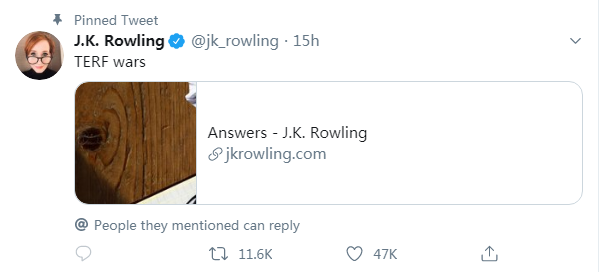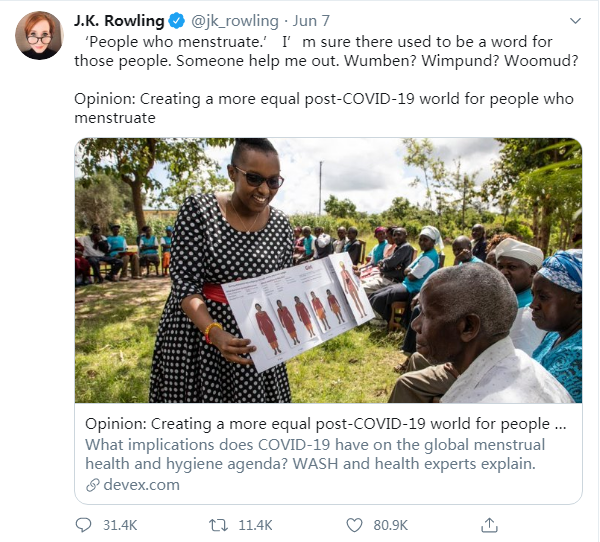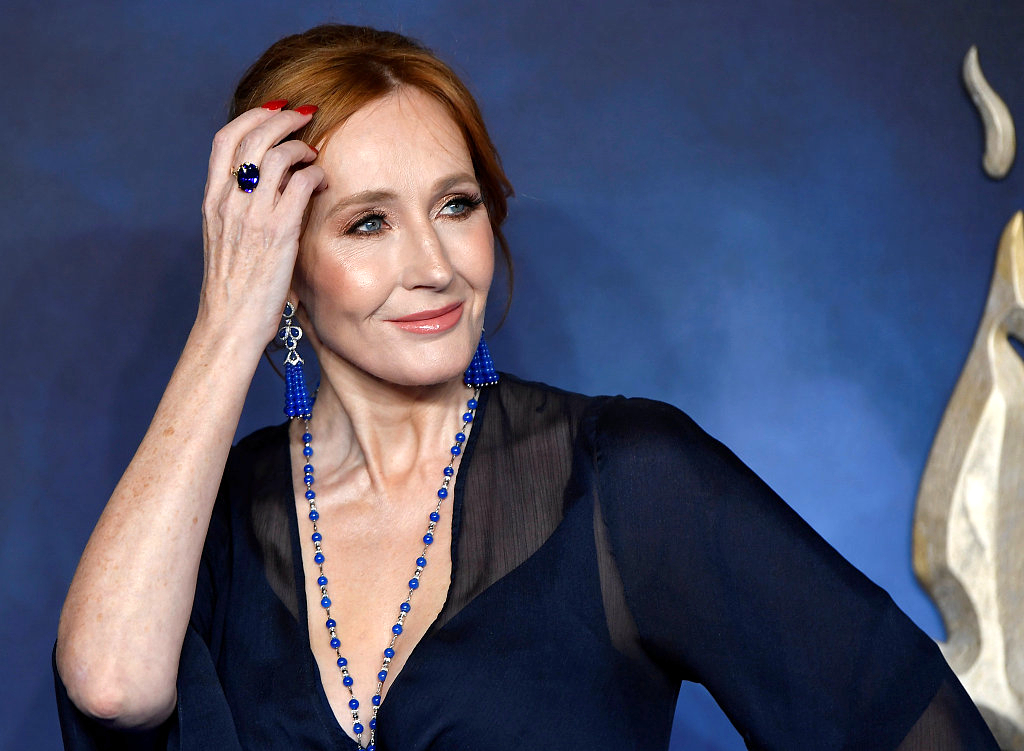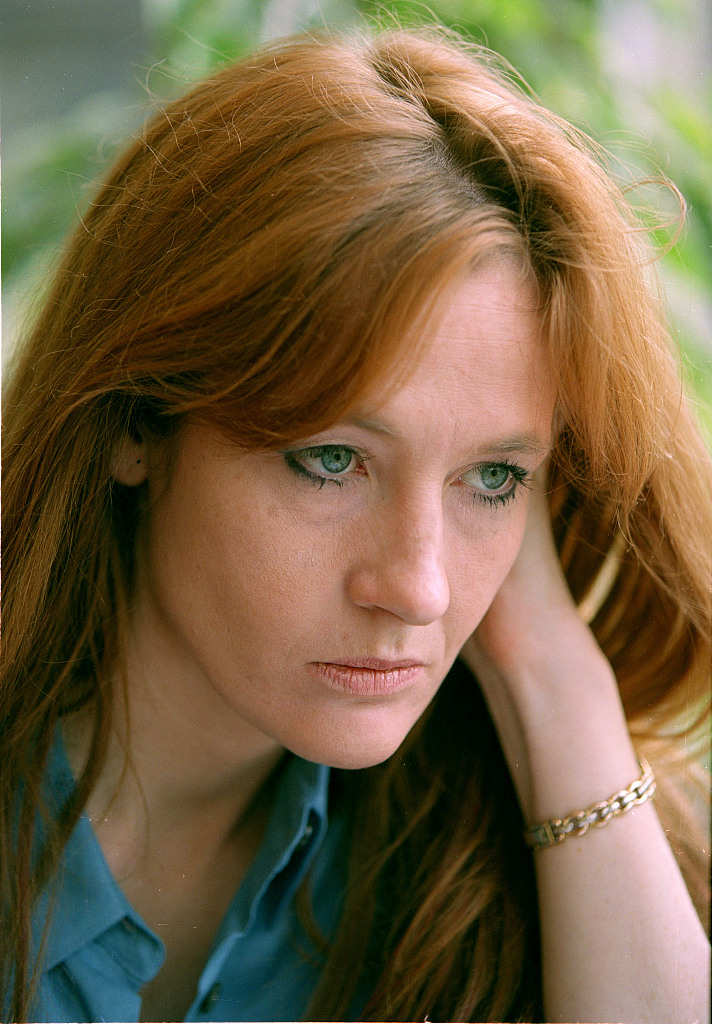
J. K. Rowling is the author of the Harry Potter fantasy series, which has won multiple awards, and sold over 375 million copies worldwide. /VCG
J. K. Rowling is the author of the Harry Potter fantasy series, which has won multiple awards, and sold over 375 million copies worldwide. /VCG
Harry Potter author JK Rowling revealed on Wednesday that she is a survivor of domestic abuse and sexual assault.
The celebrated British writer said in a blog post that she was disclosing the information to give context to her controversial past comments about transgender women.
"This isn't an easy piece to write," Rowling said in a 3,695-word essay on gender identity and her own troubled past.
"I've been in the public eye now for over twenty years and have never talked publicly about being a domestic abuse and sexual assault survivor," Rowling wrote.

J.K. Rowling shared the link to her blog essay on Twitter. /Screenshot via Twitter
J.K. Rowling shared the link to her blog essay on Twitter. /Screenshot via Twitter
She explained that "This isn't because I'm ashamed those things happened to me, but because they're traumatic to revisit and remember."
The writer caused a scandal by tweeting last weekend about "people who menstruate" and was accused of making "anti-trans comments."

J.K. Rowling's controversial post on Twitter. /Screenshot via Twitter
J.K. Rowling's controversial post on Twitter. /Screenshot via Twitter
"I'm sure there used to be a word for those people," Rowling tweeted on June 7. "Someone help me out. Wumben? Wimpund? Woomud?"
The controversy dates back to comments from December in which Rowling expressed support for a woman who had lost her job over what her employer deemed to be "transphobic" tweets.
Rowling said on Wednesday that "accusations and threats from trans activists have been bubbling in my Twitter timeline" ever since.
"Huge numbers of women are justifiably terrified by the trans activists; I know this because so many have got in touch with me to tell their stories," she wrote.
Rowling ended her post by affirming that she was "a survivor (and) certainly not a victim."

Writer J.K. Rowling attends the British premiere of "Fantastic Beasts: The Crimes of Grindelwald" movie in London, Britain, November 13, 2018. /VCG
Writer J.K. Rowling attends the British premiere of "Fantastic Beasts: The Crimes of Grindelwald" movie in London, Britain, November 13, 2018. /VCG
"I haven't written this essay in the hope that anybody will get out a violin for me, not even a teeny-weeny one," she said.
"I've only mentioned my past because, like every other human being on this planet, I have a complex backstory, which shapes my fears, my interests and my opinions."
Rowling said she had spent many years thinking about trans issues because of her own troubles with gender identity when she was young.
"When I read about the theory of gender identity, I remember how mentally sexless I felt in youth," she wrote.

Emma Watson (L) and J.K. Rowling attend the press room at the "Orange British Academy Film Awards" at Royal Opera House. /VCG
Emma Watson (L) and J.K. Rowling attend the press room at the "Orange British Academy Film Awards" at Royal Opera House. /VCG
"As I didn't have a realistic possibility of becoming a man back in the 1980s, it had to be books and music that got me through both my mental health issues and the sexualized scrutiny and judgement that sets so many girls to war against their bodies in their teens."
Growing out of gender dysphoria
The 54-year-old said she spent a period feeling "ambivalence about being a woman" before learning that "it's OK to feel confused, dark, both sexual and non-sexual, unsure of what or who you are."
She also argued that "the current explosion of trans activism" has resulted in too many people undergoing gender reassignment surgery without giving it sufficient thought.
"I want to be very clear here: I know transition will be a solution for some gender dysphoric people, although I'm also aware through extensive research that studies have consistently shown that between 60-90 percent of gender dysphoric teens will grow out of their dysphoria," she said.

J.K. Rowling poses in a picture dated July 10, 1998, Edinburgh, Scotland. /VCG
J.K. Rowling poses in a picture dated July 10, 1998, Edinburgh, Scotland. /VCG
"So I want trans women to be safe. At the same time, I do not want to make... girls and women less safe."
But she also stood up for her right to speak freely about an issue that she said has been with her throughout life.
"As a much-banned author, I'm interested in freedom of speech and have publicly defended it, even unto Donald Trump," she wrote.
Rowling's books have been banned in parts of the world because of their association in some cultures with witchcraft and the occult.
(With input from AFP)